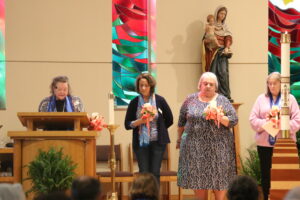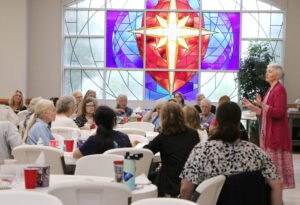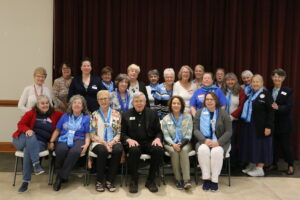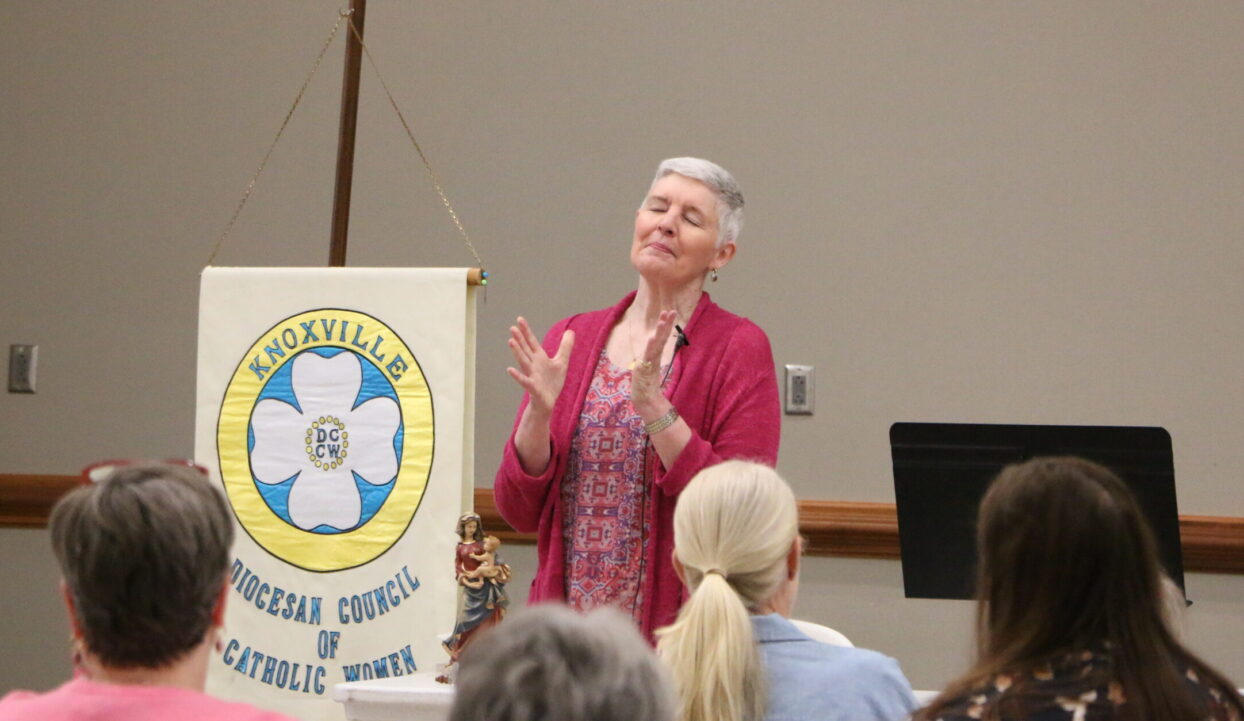KDCCW retreat focuses on prayer, forgiveness, living as an image of God
By Emily Booker
The Knoxville Diocesan Council of Catholic Women (KDCCW) held a one-day retreat for women in the Diocese of Knoxville on April 27 at All Saints Church in Knoxville. The retreat, “Come to the Table: A Renewed Encounter with Jesus,” was a day focused on forgiveness, healing, and the power of prayer.

During a Mass of Remembrance on April 26, the KDCCW remembers all women of the diocese who died the previous year. Patricia Forde reads the names of the deceased women as Amelia Sweeney, Karen Marabella Miller, and Kathy DeAngelis hold candles for each deanery. (Photo Emily Booker)
The evening before the retreat, the KDCCW celebrated its annual Mass of Remembrance honoring each woman of the diocese who died in the past year. Father Dan Whitman, chaplain of the KDCCW, celebrated the Mass, and Father Ray Powell, spiritual moderator of the Cumberland Mountain Deanery CCW and pastor of St. Mary Parish in Oak Ridge, concelebrated. Deanery representatives held candles as the name of each deceased woman was read.
Speaker and author Genevieve Kineke, who wrote The Authentic Catholic Woman, was the featured speaker of the retreat. A convert to Catholicism, Mrs. Kineke said she was drawn to the practical question of how to live out her new faith and what it means to be a woman made in the image of God.
She encouraged the more than 130 women gathered to live their lives as icons of the Church.
“There’s a nuptial backdrop to all of creation,” she said, noting that from Eve being created from the side of Adam to the Church being created from the wound in Christ’s side at His crucifixion, there is nuptial imagery throughout the Bible.
“You can look at the Church in two different ways. When a lot of people think of the Church, they think of the pope, the cardinals, the archbishops, the bishops, the priests and the deacons, the hierarchy of the Church,” she said. “Fine, of course. That is what is called the Petrine Church, Petrine meaning related to St. Peter, the first pope. That’s the bridegroom. And there’s another way of looking at the Church: the Marian Church. As I said, the Church was born from the side of Christ. In that sense the Church is the bride along the line of created wisdom, daughter of Zion, city of Jerusalem. …”
“So, when you hear Church, anything about the Church, you should go ‘ooh, that’s about me.’ Because the beautiful thing is all of you are called to be icons of Holy Mother Church.”
What does being an icon mean? Mrs. Kineke explained that being an icon of the Church means looking at the truth and role of the Church and applying that on a micro scale to one’s own life.
For example, in baptism, the Church washes away original sin and welcomes a person into the body of Christ.
“Washing and welcoming. This whole idea of creating order, keeping things clean, hospitable to the people, and we do this on different levels,” she said. “Do we welcome people? Now maybe in your home, your little apartment, your little bedroom under the stairs because you’re a mother-in-law, I don’t know. … This is what I mean by you take a sacrament and say ‘What is the Church doing?’ and then ‘How do I live as an icon or an echo of this in my little world?’”
Each woman living as an icon of the Church will look different, Mrs. Kineke noted. There is no one way to live holiness.
“You’ve got the Church as mother and teacher. You’ve got the Church as wisdom. You’ve got all the dimensions of the Church. And you say, ‘OK, how do I fit into this template?’ And the beautiful thing is every single one of us in this room does it differently,” she said.
“You have different strengths. You have different foibles. You have different husbands or no husbands. You might be married, you might be single, you might be widowed, or you might be divorced. It doesn’t matter. You have different incomes. You have different jobs. You have different everything,” she added. “So, the point of this template is that you sit before the Blessed Sacrament, and you say, ‘Dear Lord, how do I live as an icon of your bride?’”
The purpose of living as an icon of the Church is to share Christ and His Church in the world, to align one’s life with the mission and vocation of the Church.
“In the end though, what is the vocation of the Church? If we’re all going to live as icons of Holy Mother Church, in our own beautiful and unique ways, what is the vocation of the Church?” she asked. “The vocation of the Church is to receive the Word of God and to give life to the world. The vocation of the Church is to love.”
However, she noted, most people fail to love fully because they have been hurt in the past. Carrying the weight of past hurts limits people from being able to love as Christ instructed.

Mrs. Kineke speaks to the women attending the KDCCW retreat at All Saints Church in Knoxville about living as icons of the Church and the power of forgiveness. (Photo Emily Booker)
“Each one of you is called to love and be a beacon of the truth and a proclaimer of the Word and a safe place,” she said. “So, why don’t we love? Because we’re not stupid. We loved, and we got hurt. You learn very early on as a child that all of your efforts at love are not well received. And people who were supposed to love you let you down. And some people who loved you not only scandalized you but hurt you badly.”
That, she said, is why forgiveness is so important. “If you’re not going to love because you are injured, that’s a problem. It’s a perfectly logical response, but the Church demands that you love anyway. And that’s why we’ve got to transcend those wounds. How do we do it? We do it through forgiveness.”
She discussed how forgiveness is not excusing an injury, nor is it a feeling that one waits for. It is a choice and an action that is a critical step in healing and learning to love.
“If you’re waiting for the right apology or for them to change, it’s not going to work. You have to forgive anyway. For your peace of mind, for your ability to see the clarity, and for your ability to love, because the world is desperate for love, desperate for mother love.”
“Forgiveness is not excusing the injury. … You are not going to chew down the sides. The idea of forgiveness is not to work it down to something palatable and forgive just the tiny little bit that’s left over. You forgive the worst of it. … Then, after you’ve forgiven, your heart can soften,” she advised.
Mrs. Kineke discussed how the process of forgiveness can be helped by sharing one’s struggles with a trusted friend and talking through all the emotions of a situation. She also emphasized the need to go to confession as part of the process of forgiveness.
Finally, Mrs. Kineke shared a special resource for women in later stages of life.
Domus Aurea, which means “house of gold,” is her small resource book on prayer for women over 50 or in the empty-nest stage of life. Mrs. Kineke designed Domus Aurea for women who might feel a little lost in their vocation after their children leave the home.
“When I hit the empty nest, I was gobsmacked, and I was utterly disoriented. … I was shocked at how hard it was, with all my book learning, how hard it was to have an empty nest. And I go, what now? I’m in a new phase of life; what am I going to do?” she shared.
“For empty nesters who kind of wonder what’s the point, what am I doing? You are going to do your part in saving civilization,” she continued.
She had tables of participants write down advice they had received from the women in their lives. They discussed the virtues and social conventions shared by these women, advice and influence that still remains long after those women have passed on.
“How many things on the list are from older, maybe fragile women in your life, who had no pulpit, had no platform as they say today, and they were making a difference?” Mrs. Kineke asked. “Here we are 40, 60 years later remembering what they told us because they loved us. And it did make a difference. I want you to understand that what you say makes a difference.”

The Knoxville Diocesan Council of Catholic Women board pauses for a picture during the KDCCW retreat. This was the first year the KDCCW hosted a one-day retreat in lieu of its annual convention. The retreat successfully drew more than 130 women in attendance. (Photo Emily Booker)
Mrs. Kineke talked about the power of prayer and how important a strong prayer life is, not just for the individual but the whole world. She encouraged all women, but especially older women, to recognize their role in praying for the world and growing in holiness.
Jeanie Matthews, vice president of the Smoky Mountain Deanery CCW and chair of the event, said she felt that Mrs. Kineke was a good fit as speaker for “Come to the Table: A Renewed Encounter with Jesus” because she spoke about laying down resentments at His table and asking the Lord for forgiveness and healing.
“All the feedback that I’ve heard so far has been that they were very grateful for her coming,” Ms. Matthews said. “A lot of women really needed to hear about forgiveness at this time. I feel like it’s just the right time to revisit forgiveness.”
After the afternoon talk, there was time for reflection and confession. The day concluded with Vigil Mass.
The one-day retreat was held in lieu of the KDCCW’s annual three-day convention. The KDCCW made the change of alternating convention years with biannual events in order to draw more participants, give them a taste of the KDCCW, and offer a day solely focused on spiritual needs.
“This is the first time that the KDCCW has done a one-day retreat in lieu of a convention, so we were very excited,” Ms. Matthews said.
The KDCCW will hold its 2025 Convention at St. Mary Church in Johnson City April 24-26. You can learn more about the KDCCW and its parish affiliates at www.kdccw.org.

